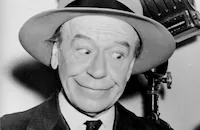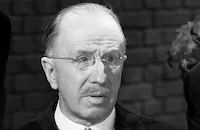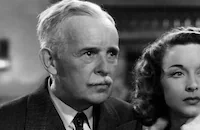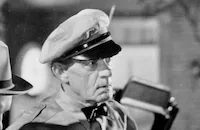Pennies From Heaven

Brief Synopsis
Cast & Crew
Norman Z. Mcleod
Bing Crosby
Madge Evans
Edith Fellows
Louis Armstrong
Donald Meek
Film Details
Technical Specs

Synopsis
As convict Hart is on his way to be executed, he entrusts fellow inmate Larry Poole with a note to be given to the Smith family in New Jersey. Out of prison, as Larry sings with young Patsy Smith in an apartment courtyard for pennies, he meets county welfare worker Susan Sprague, who wants to place Patsy in an orphanage. After Patsy introduces Larry to her grandfather, Gramp Smith, he and Larry eat lunch by the river and Larry gives him Hart's note. As retribution for killing Patsy's father, Hart has enclosed a key to his hideout, which is now reputed to be a haunted house. When Mr. Carmicheal of the Union County Welfare Board orders Susan to put Patsy in an orphanage because Gramp has no money to support her, Larry comes up with a plan: the Haunted House Cafe. On opening night, however, the sheriff arrests the cafe's orchestra leader Henry, and his band for stealing the chickens that provided food for the customers. To pay the tavern license, Larry takes a job at the fairground as a daredevil, but his plane crashes and he is hospitalized. Gramp brings word that Patsy has been put in the orphanage and he is forbidden to see her. When Susan learns this, she quits the Welfare Board and becomes Patsy's friend. Then, Larry puts on a show at the orphanage so that he may rescue Patsy from the home, but after Patsy tells him of Susan's change of heart, she is caught. Larry searches for Susan all over New York City, but when he finds her, he is arrested. Patsy, on a hunger strike, has persuaded the orphanage that she is too much trouble, and Susan and Larry, now married, adopt her.

Director

Norman Z. Mcleod
Cast

Bing Crosby

Madge Evans
Edith Fellows

Louis Armstrong

Donald Meek

John Gallaudet
William Stack

Nana Bryant
Tommy Dugan
Nydia Westman
Tom Ricketts
Morgan Wallace

Arthur Hoyt
Charles Wilson
Sid Saylor
Billy Dooley
Harry Depp
Eddie Borden
George Chandler
Frank Darien

Howard C. Hickman
Harry Tyler
Stanley Andrews

Lew Kelly
Mickey Daniels
Stanley Blystone
Maston Williams
William Anderson
Nick Copeland
Frank Austin
Edward Peil Sr.
Budd Fine
Harry Hollingsworth
Georgie Billings
Eugene Anderson Jr.
Anne Schaefer
Crew
Norman Blackburn
John Burke
Emanuel Cohen
Stephen Goosson
Arthur Johnston
Sam Nelson
Robert Pittack
William Rankin
John Rawlins
Glenn Rominger
George Stoll
Jo Swerling
John Scott Trotter

Videos
Movie Clip
Hosted Intro
Film Details
Technical Specs

Award Nominations
Best Song
Articles
Pennies from Heaven (1936) - Pennies From Heaven (1936)
By the mid-1930s, few Hollywood musicals were acknowledging the Great Depression on screen, preferring stories and settings of the rich and glamorous. Pennies from Heaven was an exception. While it certainly feels like a typically breezy vehicle for Crosby, with his easygoing character wandering into a trifle of a story, there are glimpses of the tough times at hand. In jail as the story begins, Crosby is asked by a condemned prisoner to look after his little girl when Crosby gets out, and to move her and her grandfather into an old family estate. The place is spooky and the family needs money, so naturally Crosby turns the property into a restaurant/nightclub called the Haunted House Cafe - conveniently providing a fine excuse for musical numbers.
Pennies from Heaven is not full of out-and-out song classics, but its score by Johnny Burke and Arthur Johnston is enjoyable and features "One, Two, Button Your Shoe," "So Do I," "Let's Call a Heart a Heart," "Now I've Got Some Dreaming To Do," and of course the title song, which was nominated for an Oscar® but lost to Jerome Kern and Dorothy Fields's "The Way You Look Tonight," from Swing Time. (What an embarrassment of riches the Best Song category was in those days.)
Johnny Burke's collaboration with Crosby was the beginning of an important artistic partnership. As Crosby later wrote, "one of the best things that's happened to me is a one hundred and forty-five pound Irish leprechaun named Johnny Burke." While Burke had had a bit of success in the music industry and had done some minor work-for-hire at Twentieth Century Fox, he was essentially new to the movies. Crosby liked him immediately and decided to give him a chance on Pennies from Heaven. They would become good friends, and for seventeen years Burke was Crosby's personal songwriter, penning such classics as "Moonlight Becomes You," "I've Got a Pocketful of Dreams," "What's New?," and "Swinging on a Star." The song "Pennies from Heaven" was shot live with a full orchestra on the soundstage, instead of pre-recorded as was the norm. The track became so popular that it set new highs in national record sales, and it was covered by many other artists in the years following.
Another musical highlight is "Skeleton in the Closet," performed by Louis Armstrong in the Haunted House Cafe with Lionel Hampton on the drums. Armstrong had had an enormous influence on Crosby's singing style ("He is the beginning and the end of music in America," said Crosby) and now that Crosby had some clout, he wanted to give back a little by featuring Armstrong in the movie. According to Crosby biographer Gary Giddins, Harry Cohn balked at this request, "seeing no reason to entail the expense of flying him in and having no desire to negotiate with Armstrong's crude, mob-linked but devoted manager, Joe Glaser. Bing refused to discuss the matter. [Armstrong] was about to make his Hollywood debut."
Not only did Armstrong make his studio feature debut (an earlier independent feature is lost) he shared billing with the three primary stars of the picture - something that had never before been done for a black performer in a mainstream movie. Again, this was Crosby's doing. The prominent billing along with Armstrong's charming performance (he has some comic dialogue scenes, too) did wonders for Armstrong's career. He swiftly became a regular presence in the movies, often playing himself, and for this he was appreciative of Crosby for the rest of his life. As Armstrong said thirty years later, "Here's paying tribute to one of the finest guys in this musical and wonderful world. With a heart as big. Carry on Papa Bing, Ol' Boy!!"
Producer: Emanuel Cohen
Director: Norman Z. McLeod
Screenplay: Katherine Leslie Moore (novel), Jo Swerling
Cinematography: Robert Pittack
Film Editing: John Rawlins
Art Direction: Stephen Goosson
Music: Johnny Burke, Howard Jackson, Arthur Johnston, Louis Silvers, William Grant Still, John Scott Trotter
Cast: Bing Crosby (Larry Poole), Madge Evans (Susan Sprague), Edith Fellows (Patsy Smith), Louis Armstrong (Henry), Donald Meek (Gramps), John Gallaudet (J.C. Hart).
BW-80m.
by Jeremy Arnold

Pennies from Heaven (1936) - Pennies From Heaven (1936)
Quotes
Trivia
Notes
Louis Armstrong appeared with his band in the film. Reviews list Tom Rickets in the role of Mr. Briggs, while the CBCS credits Richard Carle. The title song was nominated for a 1936 Academy Award for Best Song. Katharine Leslie Moore's novel was also the inspiration for a 1981 film, directed by Herbert Ross and starring Steve Martin in the lead role. The 1981 film was also based on a six-part BBC television production written by Dennis Potter and starring Bob Hoskins.
















